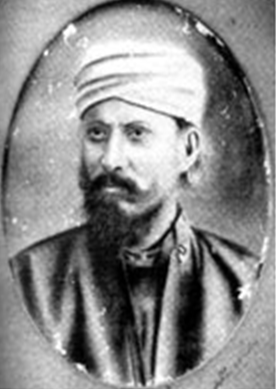Jamaluddin al-Afghani
This is a collection of articles archived for the excellence of their content. Readers will be able to edit existing articles and post new articles directly |
Afghani’s Anti-Colonial Vision
A theme of enduring interest in modern history has been Muslim anti-colonial resistance based on selective appropriations from the ideology of jihad. As early as the 18th century, Tipu Sultan (1750-1799) invoked the idea of universal Islamic sovereignty when he endorsed the idea of a caliphate centered in the Ottoman Empire to counter European expansionism.
His defiant struggle against the East India Company’s armies and Sayyid Ahmad Barelvi’s valiant jihad against the Sikhs have represented the most potent symbols of resistance in Indian Muslim consciousness. Their power to inspire anti-colonial sentiments was buttressed by other stories of heroic armed struggle against Western imperialism emanating from different parts of the Muslim world. Resistance to the Russian presence in Dagestan and Chechnya, led by Imam Shamil, for instance, held romantic appeal for politically conscious Indian Muslims, even if few dared follow in his footsteps.
Identification with the struggle of co-religionists in the colonised Muslim world was reinforced by the questions that commonly arose with the onset of Western colonialism. From India to West and Central Asia, as well as in Africa, Muslims in the late 19th century pondered over the obligation to fight a jihad or perform hijrat and reacted in diverse ways to the appearance of every new Mahdi claiming to lead the faithful out of infidel rule.
Beginning with Abdul Qadir (1808-1883) who fought against the French between 1832 and 1834, several Mahdist revolts were staged in Algeria during the second half of the 19th century. As in the case of Sayyid Ahmad Shaheed, Abdul Qadir’s efforts to raise taxes by establishing centralised control over the tribes and religious brotherhoods led to his downfall.
During the Mahdist revolt in the Sudan, the guardians of orthodoxy rejected the claims of Muhammad Ahmad (1844-1885) to be the Mahdi (divinely guided vice-regent), on the grounds that established authority had to be obeyed.
Although he failed to preserve Sudanese independence, Muhammad Ahmad’s courageous stand against the joint British and Egyptian forces aroused widespread respect and admiration in the Muslim world.
Jamaluddin al-Afghani was among those who looked on the Mahdist revolt as a model worthy of emulation in struggles against British imperialism. Unlike Sayyid Ahmad Khan, whose vision was limited to India, Afghani took a global view of the Muslim predicament. A ‘strategist of defeat and survival’ for the dejected Indian Muslim community, Sayyid Ahmad has been contrasted with Afghani —the ‘strategist of defence’ for the ummah against an encroaching and predatory West.’
Although Afghani lived briefly in India, his ideas had limited appeal there until after the outbreak of World War I. Not only were his ideas impracticable in the conditions prevailing in late 19th century India, but an effective strategy of defence required a rearguard attempt to ensure the survival of the community.
Sayyid Ahmad Khan’s emphasis on correcting British misconceptions about the inherent disloyalty of Britain’s Muslim subjects has to be seen in context: all religious communities in late 19th century India vied with one another in professing loyalty to the Raj.
Instead of making appeals in the name of religion, [Afghani] tried to instruct Egyptians and Indians on the power of a common language and shared history to unify diverse communities. Without unity and patriotism, neither the Egyptians nor the Indians had any hope of fighting colonialism.
Like all matters of temporal expediency, Sayyid Ahmad’s policy of collaboration was overshadowed by the changing tenor of global politics. Between 1875 and 1882 a series of political events dramatically altered Europe’s relations with West Asia.
For Indian Muslims, the outbreak of the Russo-Turkish war of 1877-78, coinciding with the proclamation of Queen Victoria as empress of India, marked the start of an inexorable process of disillusionment with the policy of unconditional collaboration. A vibrant popular press widely disseminated news of the proclamation of jihad issued by the Sheikh-ul-Islam of Constantinople.
In the sanguine opinion of Sayyid Ahmad Khan’s Aligarh Institute Gazette, the Indian Muslim response to the call for jihad was unlikely to extend beyond pious prayers to heaven.
Even the ‘most bigotted Musalman cannot but confess that peace and security, such as exists under the British rule, though it is not altogether free from faults is not to be found in any Muhammadan kingdom on the earth.’ One Urdu newspaper promptly countered this assertion by publishing emotional verses showering blessings on the Ottoman sultan and invoking the curse of God on his enemies: ‘May the whole Russian army perish under the Turkish arms; may the earth split under the infidel army of the czar and the sky fall down upon their heads; may the heart of the czar burn with the fire of repentance, and his life be in the claws of death; may the angel Israel snatch his soul from his body and hell dress its fires to receive him.’
Muslims donated enthusiastically to the Turkish relief fund and some even contemplated taking up arms in response to calls for jihad issued at local mosques. At the end of the war, the Indian Muslim press blamed Britain for its ineffectual assistance to the Turks in their hour of need and for engaging, even more unforgivably, in intrigues at the Congres of Berlin that resulted in the loss of four-fifths of the Ottomans territory in Europe.
India, where pro-Ottoman sentiment was running high, offered fertile ground for Afghani’s hopes of reviving the idea of a universal Muslim caliphate as the first step toward a coordinated Muslim jihad against European imperialism. If jihad was his preferred antidote to the rapid shrinkage in the territories of Dar-ul-Islam, he favored a universal caliphate to correct the fragmentation of religious authority that he identified as the cause for the decline of Islam.
A savvy political operator rather than a profound or original thinker, Jamal-uddin left a limited corpus of writings, which does not include a treatise on jihad. Being less interested in the form than in the substance of the struggle against the British imperial presence in the East, Afghani adapted his spoken and written words to suit his audience.
With the threat of colonialism hovering over Egypt and India, he promoted territorial nationalism rather than the Islamic universalism for which he is renowned.
Instead of making appeals in the name of religion, he tried to instruct Egyptians and Indians on the power of a common language and shared history to unify diverse communities. Without unity and patriotism, neither the Egyptians nor the Indians had any hope of fighting colonialism.
Afghani was a remarkable but cryptic man. He concealed his Persian national origins and, despite his heterodox beliefs, went to great lengths to appear as Sunni as the next Muslim. Duplicitous in his thought and inscrutable in his actions, he was a shadowy presence that appeared to be everywhere and nowhere at the same time.
Who was Jamaluddin al-Afghani?
Who was Jamaluddin al-Afghani? In some rare and insightful rhymed prose that anticipates later questions about his identity, he wrote:
The English people believe me a Russian [Rus] The Muslims think me a Zoroastrian [Majus] The Sunnis think me a Shi’i [Rafidi] And the Shi’i think me an enemy of Ali [Nasibi] Some of the friends of the four companions have believed me a Wahhabi. Some, of the virtuous Imamites have imagined me a Babi. The theists have imagined me a materialist. And the pious a sinner bereft of piety.
The learned have considered me an unknowing ignoramus. And the believers have thought me an unbelieving sinner. Neither does the unbeliever call me to him. Nor [does] the Muslim recognise me as his own. Banished from the mosque and rejected by the temple.
I am perplexed as to whom I should depend on and whom I should fight. The rejection of one requires affirmation of the other. The affirmation of one makes the friends firm against its oppo site. There is no way of escape for me to flee the grasp of one group. There is no fixed abode for me to fight the other party.
Single-minded in his opposition to British imperialism but unsure of what fate had in store of him, Afghani made a virtue out of the Shia strategy of dissimulation he had learned in his youth.
Though he posed as an Afghan, it is now known that Sayyid Jamaluddin was born in Asadabad near Hamdan, into a family that traced its lineage to the family of the Prophet (Peace be upon him). He received training in the traditional Islamic sciences in Iran, Iraq, and Afghanistan before visiting India for the first time 1854.
During a stay lasting over a year, he gained his initial exposure to the methods of Western science. His next visit was in 1869, when he made a timely escape from Afghanistan after ending up on the wrong side of the succession dispute among Emir Dost Muhammad’s sons.
Although the British Indian government received him with honour, Afghani was prevented from meeting Indian Muslim opinion makers.
After a month, the colonial state put him aboard a ship to Suez. He arrived in Cairo for the first time and came into contact with the faculty and students of Al-Azhar. Afghani next headed for the Ottoman capital abuzz with Sultan Abdul Aziz’s attempts to promote himself as the universal caliph of Islam.
Here Afghani rubbed shoulders with the Ottoman ruling elite and spoke freely about religion. Jealous of his growing prestige, the Sheikh-ul-Islam of Constan-tinople castigated him for giving a lecture exalting philosophy and reducing prophecy to a mere craft, thereby implying that the Prophet was an artificer or a craftsman.
Jamaluddin had not dared deny the superiority of prophecy over philosophy. Prophecy was a divine gift whose infallibility was unquestionable, whereas a philosopher, whose knowledge was acquired through thought and study, could fall into error. But like prophecy, a correct philosophical point of view was the means to spiritual perfection through ethical refinement and moral purification.’Charged with blasphemy, Afghani was forced to leave Constantinople. After this close shave, he scrupulously avoided entering into theological controversies with the ulema and instead concentrated on promoting the study of philosophy in the light of modern knowledge.
He returned to Egypt, where he attracted droves of students. He taught them philosophy and western science, to the outrage of traditional theologians.
Suspicious of the political activities he undertook in concert with the ‘Young Egyptians’ led by Arabi Pasha, the British engineered Afghani’s expulsion from Egypt.
This turn of events brought Afghani to India, where he lived in Hyderabad and Calcutta between 1879 and 1882. The colonial state, alarmed by Arabi Pasha’s revolt in Egypt, feared an uprising in India and kept him under close surveillance.
It was during this period that Afghani emerged as a virulent opponent of Sayyid Ahmad Khan’s loyalist policy. There is no evidence that he had contacts with the so-called Wahabi followers of Sayyid Ahmad Barelvi or, if he did meet them, that he became close to any of the leading Indian Muslim modernists or ulema.’
There are surprisingly few references to him in colonial archives. The most often cited is a letter written in June 1883 by Sayyid Husain Bilgrami of Hyder-abad to the British resident, describing Afghani as ‘a free thinker of the French type, and a socialist’ who was ‘shallow in his acquirements.’
This description stands in complete contrast to the standard portrayal of him as a defender of Islam who exhibited a revulsion toward the Aligarh variety of intellectual modernism. Though Afghani couched his antipathy in religious terms, the difference between him and Sayyid Ahmad Khan was political and did not, as is often mistakenly held, result from their conflicting conceptions of Islam.
Sayyid Ahmad
Sayyid Ahmad maintained that he supported the colonial government not out of love or loyalty for the British, but because the best course for Indian Muslims was to win safeguards from the established government of the time. This position was unacceptable to Afghani, who described British imperialism as ‘a dragon which had swallowed 20 million people’ and, having drunk up the waters of the Ganges and the Indus, was ‘still unsatiated and ready to devour the rest of the world and to consume the waters of the Nile and the Oxus.’
Sayyid Ahmad Khan's emphasis on correcting British misconceptions about the inherent disloyalty of Britain's Muslim subjects has to be seen in context: all religious communities in late 19th-century India vied with one another in professing loyalty to the Raj.
Fancying himself as the Martin Luther of Islam, Afghani was an improbable opponent of Sayyid Ahmad Khan’s modernist rationalism and reformist ideas. But Afghani despised the Aligarh movement’s religious and educational agenda, which smacked to him of political servitude to the British.
Education that served the interests of foreign rulers was worse than no education. Instead of their hollow imitation of the conqueror’s values, Indian Muslims needed an education that inculcated pride in their own ‘civilisation’ and helped them develop an indigenous ideology for reform and self-strengthening. Any policy of collaboration with the oppressors could only tighten the bonds of subjugation and had to be countered with all means, fair and foul.
Sayyid Ahmad Khan’s excessive admiration of British rule amounted to an ‘abandonment’ of Islam, which by ‘disparag[ing]... the interests of the fatherland’ was fanning ‘discord among the Muslims.’
Like those he mocked as Necharis and referred to as Aghuris, the lowest and most despised of sects in India, Afghani took an evolutionary view of history.
He shared Sayyid Ahmad’s belief that scientific knowledge not only was consistent with Islamic teachings but represented an outgrowth of the past achievements of Islamic civilization.
But unlike his Indian counterpart, Afghani did not engage in hair-splitting disputes with the ulema by trying to promote a new theology. This restraint did not prevent him from lambasting the guardians of Muslim orthodoxy for their prejudice against philosophy and their stubborn refusal to accept modern science, simply because it had originated in the West.
Nothing could be stranger than the ulema’s arbitrary division between ‘Muslim science’ and ‘European science.’ They had ‘not understood that science is that noble thing that has no connection with any nation.’
Without having actually delved into the Indian Muslim reformer’s writings, the eminent Middle Eastern historian Albert Hourani thought that Afghani’s claim that Islam was consistent with human reason was a far cry from Sayyid Ahmad’s attempt to interpret Islam on the basis of a rational understanding of natural law.
While Afghani is depicted as ‘a convinced Muslim’ who ‘accepted the fundamental teachings of Islam with all his mind,’ Sayyid Ahmad is presented as a secular modernist, who held human reason to be above divine revelation.
His Muslimness is deemed suspect because he wanted a rational interpretation of the Quran in order to formulate a moral and legal code governing the laws of nature. Such a sweeping claim can be easily twisted to justify the fatwas given by ulema in Mecca and Medina against Sayyid Ahmad Khan. These condemned him as an apostate and a dangerously misled man who was better dead than alive.
Books & Authors reserves the right to edit excerpts from books for reasons of clarity and space.
Ayesha Jalal is a Pakistani-American historian and a professor of history at Tufts University. Her works mainly deal with the creation of Muslim identities in modern South Asia.


